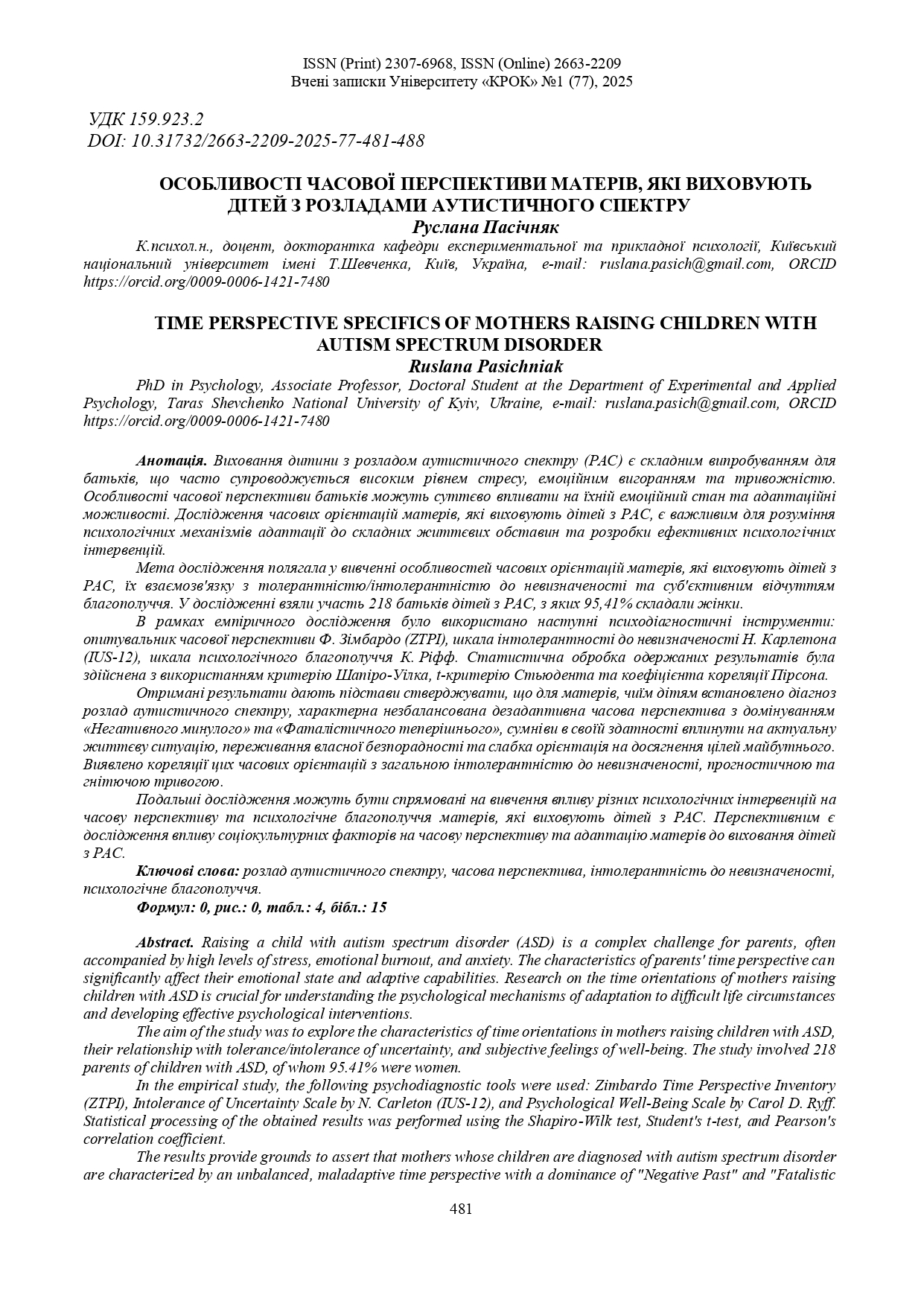TIME PERSPECTIVE SPECIFICS OF MOTHERS RAISING CHILDREN WITH AUTISM SPECTRUM DISORDER
DOI:
https://doi.org/10.31732/2663-2209-2025-77-481-488Keywords:
autism spectrum disorder, time perspective, , intolerance of uncertainty, psychological well-beingAbstract
Raising a child with autism spectrum disorder (ASD) is a complex challenge for parents, often accompanied by high levels of stress, emotional burnout, and anxiety. The characteristics of parents' time perspective can significantly affect their emotional state and adaptive capabilities. Research on the time orientations of mothers raising children with ASD is crucial for understanding the psychological mechanisms of adaptation to difficult life circumstances and developing effective psychological interventions.
The aim of the study was to explore the characteristics of time orientations in mothers raising children with ASD, their relationship with tolerance/intolerance of uncertainty, and subjective feelings of well-being. The study involved 218 parents of children with ASD, of whom 95.41% were women.
In the empirical study, the following psychodiagnostic tools were used: Zimbardo Time Perspective Inventory (ZTPI), Intolerance of Uncertainty Scale by N. Carleton (IUS-12), and Psychological Well-Being Scale by Carol D. Ryff. Statistical processing of the obtained results was performed using the Shapiro-Wilk test, Student's t-test, and Pearson's correlation coefficient.
The results provide grounds to assert that mothers whose children are diagnosed with autism spectrum disorder are characterized by an unbalanced, maladaptive time perspective with a dominance of "Negative Past" and "Fatalistic Present," doubts about their ability to influence the current life situation, feelings of helplessness, and a weak orientation towards achieving future goals. Correlations were found between these time orientations and general intolerance of uncertainty, anticipatory anxiety, and inhibitory anxiety.
Further research may be directed towards studying the impact of various psychological interventions on the time perspective and psychological well-being of mothers raising children with ASD. Investigating the influence of sociocultural factors on the time perspective and adaptation of mothers to raising children with ASD is also promising.
Downloads
References
Громова, Г. М. (2021). Інструменти вимірювання толерантності до невизначеності. Адаптація тесту «Шкала інтолерантності до невизначеності» Н. Карлетона. Наукові студії із соціальної та політичної психології, 47(50), 115–130. https://doi.org/10.33120/ssj.vi47(50).217
Громова, Г. М. (2022). Толерантність до невизначеності як чинник трансформації травматичного досвіду особистості (Дис. доктора філософії). Київ.
Пасічняк, Р. Ф. (2024). Невизначена втрата в контексті емоційного досвіду батьків з розладами аутистичного спектру. Психологічний часопис, 10(4), 7–18. https://doi.org/10.31108/1.2024.10.4.1
Сеник, О. (2012). Адаптація опитувальника часової перспективи особистості Ф. Зімбардо (ZTPI). Соціальна психологія, 1/2(51–52), 153–168.
Сердюк, Л., Купрєєва, О., & Отенко, С. (2022). Салютогенетичні основи життєстійкості особистості. Вісник Київського національного університету імені Тараса Шевченка. Психологія, 1, 56–60. http://nbuv.gov.ua/UJRN/vknup_2022_1_11
Якнюнас, Є. Є., & Гусак, Н. Є. (2019). Чинники батьківського стресу батьків, які виховують дитину з розладами аутистичного спектра. Психологія та психосоціальні інтервенції, 2, 67–74. https://doi.org/10.18523/2617-2348.2019.2.67-74
Brosschot, J. F., Gerin, W., & Thayer, J. F. (2006). The perseverative cognition hypothesis: a review of worry, prolonged stress-related physiological activation, and health. Journal of psychosomatic research, 60(2), 113–124. https://doi.org/10.1016/j.jpsychores.2005.06.074
Dugas, M. J., Marchand, A., & Ladouceur, R. (2005). Further validation of a cognitive-behavioral model of generalized anxiety disorder: Diagnostic and symptom specificity. Journal of Anxiety Disorders, 19(3), 329–343. https://doi.org/10.1016/j.janxdis.2004.02.002
Dykens, E. M., Fisher, M. H., Taylor, J. L., Lambert, W., & Miodrag, N. (2014). Reducing distress in mothers of children with autism and other disabilities: A randomized trial. Pediatrics, 134(2), 454–463. https://doi.org/10.1542/peds.2013-3164
Lee, Y. J., Park, H. J., & Lee, S. Y. (2022). Learning to live with ambiguity: Rethinking ambiguous loss for mothers of children with disabilities. SAGE Open, 12(2). https://doi.org/10.1177/21582440221095014
O’Brien, M. (2007). Ambiguous loss in families of children with autism spectrum disorders. Family Relations, 56(2), 135–146.
Stolarski, M., Bitner, J., & Zimbardo, P. G. (2011). Time perspective, emotional intelligence and discounting of delayed awards. Time & Society, 20(3), 346–363.
Stolarski, M., Fieulaine, N., & van Beek, W. (Eds.). (2015). Time perspective theory: Review, research and application. Essays in honor of Philip G. Zimbardo. Springer International Publishing. https://doi.org/10.1007/978-3-319-07368-2
Yorke, I., White, P., Weston, A., Rafla, M., Charman, T., & Simonoff, E. (2018). The association between emotional and behavioral problems in children with autism spectrum disorder and psychological distress in their parents: A systematic review and meta-analysis. Journal of Autism and Developmental Disorders, 48, 3393–3415.
Zimbardo, P. G., & Boyd, J. N. (1999). Putting time in perspective: A valid, reliable individual-differences metric. Journal of Personality and Social Psychology, 77(6), 1271–1288. https://doi.org/10.1037/0022-3514.77.6.1271

Downloads
Published
How to Cite
Issue
Section
License

This work is licensed under a Creative Commons Attribution-NonCommercial 4.0 International License.

